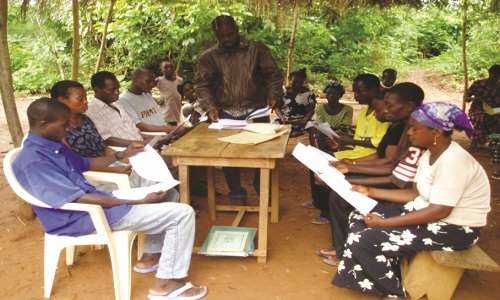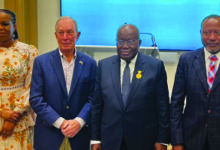
Ghana on September 8, joined the rest of the international community to celebrate International Literacy Day.
Instituted by the United Nations Education, Scientific and Cultural Organisation (UNESCO), the Day seeks to remind the international community of the importance of literacy for individuals, communities and societies, and the need for intensified efforts towards more literate societies.
The theme for this year’s global celebration is “Transforming Literacy Learning Spaces.”
It calls for governments and partners to build resilient learning spaces to withstand any challenge now, as it happened during the COVID-19 outbreak and realities ahead.
At the global level, a two-day hybrid international event is ongoing in Côte d’Ivoire.
Here in Ghana, the Complementary Education Agency, formerly Non-Formal Education Division will collaborate with UNESCO to celebrate the day at Kenyase in the Ahafo Region.
The country specific theme is “Transforming Literacy Learning Spaces for Quality, Equitable and Inclusive Education for All.”
This year’s event will commemorate the 56th anniversary of the world congress of Ministers’ of Education on the Eradication of illiteracy, which made the Tehran recommendation on the proclamation of the International Literacy Day and advanced the notion of Functional Literacy.
Progress has been made in promoting literacy over the years, although UNESCO reports that literacy challenges persist with at least 771 million young people and adults lacking basic literacy skills today.
Rapidly changing global context took a new meaning over the past years, hampering the progress of global literary efforts.
According to the 2021 Population and Housing Census conducted by the Ghana Statistical Service (GSS), Ghana’s literacy rate stands at 69.8 per cent.
This is an improvement on the statistics of the 2010 census, when the rate was 67.1 per cent.
The 2021 data cover people from age six and above who can read and write in any language.
Of the number, males make up 74.1 per cent, while females constitute 65.4 per cent.
The Greater Accra Region has the highest figure of 87.9 per cent, while the Savannah Region recorded the lowest of 32.8 per cent.
The report also reveals that four in five (80.6 per cent) of the urban population six years and older are literate in at least one language, compared to half, 55.2 per cent, of the rural population of the same age, with the rural-urban differential being similar for males and females.
It further states that four out of the 16 regions have more than three-quarters, 75 per cent, of their population six years and older being literate, with Greater Accra recording the highest, 87.9 per cent, while Savannah has the lowest of 32.8 per cent.
Additionally, the report says that the male population in eight regions has literacy rates below the national figure, compared to females in 12 regions.
And across the three age brackets, about half of females in rural areas are not literate in any language, compared to a little over a third of males.
It adds that three in 10 — 30.2 per cent — people six years and older are not literate in any language, and is higher among females, 34.4 per cent, than males, 25.9 per cent.
On school attendance, the report further indicates that the proportion of the population three years and older that have never attended school ranged from nine per cent in Greater Accra to 57.4 per cent in Savannah.
And the proportion of persons three years and older currently attending school in the Northern, Savannah, North East, Upper East and Upper West regions is about twice as high as those who attended in the past.
On tertiary education, four in 10 — 40.7 per cent — of the population 18 years and older currently attend tertiary school, while in the 2010 census, 13 per cent of people attained tertiary education.
The report also said that among people 15 years and older (females) who attended school in the past attained JSS/JHS education, 54.3 per cent, as compared to their male counterparts, 45.7 per cent in urban areas, and almost equal the proportion of females, 50.6 per cent, and males, 49.4 per cent, in rural areas.
The report indicates that Ghana is working towards improving literacy at all age groups. However, more work is required to enrich and transform the existing learning spaces through an integrated approach and enable literacy learning to ensure no one is left behind.
Director-General of UNESCO, Ms Audrey Azoulay, on the occasion of this year’s International Literacy Day, echoed the need for more investment in education and increased international aid, along with more open, free and high-quality educational resources.
International Literacy Day, she explained, is an opportunity to assess progress and spur momentum towards celebrating literacy as an essential human right that plays a fundamental role within societies and called on all actors in the field of education and beyond to re-think the role of literacy.
In view of school closures and disruptions caused by COVID-19 which have likely driven learning losses and drop-outs, she urged countries to redoubletheir efforts to ensure that progress made in recent decades is not reversed, but reinforced.
Ghana’s efforts to improve literacy predated the pandemic. It has, since independence in 1957, prioritized the development of education and the eradication of illiteracy as a strategy of promoting development and social empowerment.
Accordingly, over the past five decades, the country instituted various educational acts, the most fundamental being the Education Act of 1961 and the 1992 Constitution (article 38, sub-section 2) which laid the legal basis for the provision of education as a basic right for all citizens.
Additionally, beginning in 1995, Ghana rolled out the Free and Compulsory Universal Basic Education (FCUBE) in order to make education more accessible to all in line with its constitutional obligations.
Today, Ghana’s response to addressing literacy challenges has been given extra impetus following the implementation of the Transition to English (T2E) Plus program across 5,425 schools to improve learners’ reading performance among pupils from kindergarten 2 to primary 3.”
T2E Plusairs supplemental radio reading lessons nationwide, as well as to conduct training, coaching and mentoring for teachers and other education personnel. It will also provide teaching and learning materials for pupils.
Additionally, the coming into force of the Complementary Education Agency Act 2020, which seeks to provide for educational programmes outside the formal education system can prove to be the game-changer.
Under the initiative, the name of the Non-Formal Education system has been changed to the Complementary Education Agency to provide learning opportunities and complementary education for those who are outside the mainstream formal education system, help to equip requisite knowledge and skills as well as oversee the provision and administration of quality complementary education and provide for related matters.
What is needed now is the establishment of learning centres across the country to provide education to non-literates.
A literate population is critical if the country is to make a giant leap towards eradicating poverty, illegal mining, indiscriminate disposal of waste and many other cankers impeding growth in our various communities. .
It is vital that for Ghana to strengthen strategies aimed at ensuring that more people get educated by working towards enhancing the country’s adult educational system and supporting institutions running such programmes.
It is even more crucial after UNESCO reported that, in the aftermath of COVID-19, nearly 24 million learners might never return to formal education, out of which, 11 million are projected to be girls and young women.
The government must go all out to establish effective mechanisms and partnerships that will enable all to acquire formal education.
BY CLAUDE NYARKO ADAMS




